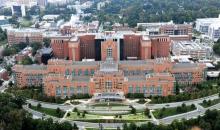Overview
At the Surgical Neurology Branch, we are dedicated to fostering excellence in education and training. Through our rigorous programs, we empower aspiring neurosurgeons to become leaders in the field. Our emphasis on education and training sets the stage for groundbreaking research and innovation.
Our National Institutes of Health Neurological Surgery Residency Training Program offers a comprehensive 7-year curriculum designed to produce exceptional clinical neurosurgeons. Residents undergo training across prestigious institutions, including the NIH Clinical Center and Georgetown University Hospital. The program places a strong emphasis on research, preparing residents to become adept in both clinical practice and academic leadership.
Ready to take your neurosurgical career to the next level? Explore more about our Residency Program and apply to join us in shaping the future of neurosurgery.
In addition to our residency program, SNB offers the Surgical Neurology Fellowship Program. This program provides fellows with the opportunity to delve into specific projects addressing clinical neurosurgical challenges. With a focus on formulating and testing hypotheses, fellows play a vital role in advancing research from the lab to the clinic. As active participants in both laboratory and clinical phases of research, fellows gain invaluable experience shaping the future of neurosurgery.
Interested in making a difference in neurosurgery research? Explore our Fellowship Program.
Join us in our commitment to excellence in neurosurgical education and research. Apply now and discover the opportunities awaiting you in our Residency Program and Fellowship Program pages.
Training Goals & Objectives
This program seeks to be a model for training academic neurosurgical leaders. As the sponsoring institution, the National Institutes of Health will select medical student applicants for training based on their commitment and aptitude for becoming leading neurosurgeon-investigators. Based on an innovative clinical and research curriculum, the program will provide its trainees with a systematic learning experience that equips them with neurosurgical and research knowledge and skills and prepares them to be outstanding clinicians and independent researchers upon graduation. Because the National Institutes of Health is the sponsoring institution, the program is both empowered and committed to providing the resources necessary to train residents to perform neuroscience research throughout their careers using approaches of modern biomedical research and the highest standards of quality.
To achieve these goals and objectives, robust and defined clinical and scholarly activities will be emphasized and integrated throughout each resident’s education. The program will exploit the complementary and diverse strengths of the 4 training sites. In their first 3 years of training, residents obtain a broad-based clinical education in neurosurgery at the affiliate sites and NIH, providing them an opportunity to define research questions and discover special interests. Residents spend their next 3 years at the National Institutes of Health immersed in an environment conducive to developing research skills (basic, translational, and clinical research), clinical abilities, and scholarly pursuits. Residency training concludes with a 1-year Chief Residency at Georgetown University and Washington Hospital Center.
Facilities

Residents receive mentoring inside and outside the operating room by 4 full-time clinical faculty at the NIH Clinical Center, a 240-bed hospital. Residents obtain 1 ½ years of clinical experience in the unique research environment of the NIH Clinical Center, in which all patients are enrolled in research or training protocols. Each resident also spends 2 years of protected research time (basic or translational) at the NIH. During that time they receive:
- NIH intramural funding (no grants required) for their research projects
- Training and mentoring by 4 clinical and 3 full-time research (MD/PhD or PhD) faculty of the residency program,
- Opportunity to collaborate with scientists throughout NINDS and other NIH Institutes,
- Guidance in designing and implementing prospective clinical research protocols,
- NIH clinical research training, career development, and grant writing courses.
Interested in learning more about the NIH campus? Take our virtual tour!
MedStar Georgetown University Hospital
MedStar Georgetown University Hospital is Washington's most recognized academic medical center and has been consistently ranked among the best hospitals in the nation. This 609-bed hospital is situated in the center of Georgetown, one of the oldest and most beautiful neighborhoods of Washington, D.C. As part of the MedStar Georgetown medical campus, the Lombardi Comprehensive Cancer Center has been designated by the National Cancer Institute (NCI) as a Comprehensive Cancer Center. The hospital is well invested in cutting-edge technology, including equipment for PET scan, intraoperative neuro-navigation, and frameless robotic radiosurgery.
MedStar Washington Hospital Center
MedStar Washington Hospital Center is a 900-bed, non-profit hospital, and the largest medical center in the District of Columbia . Situated in the center of the city, merely two miles north of the U.S. Capitol, it is one of the nation's top trauma centers
Children's National Medical Center
Children's National Medical Center (CNMC) is a 323-bed facility, and a leader in the development of innovative new treatments of childhood illness and injury. Among the top pediatric hospitals in America, CNMC has been serving the nation's children for more than 130 years.
